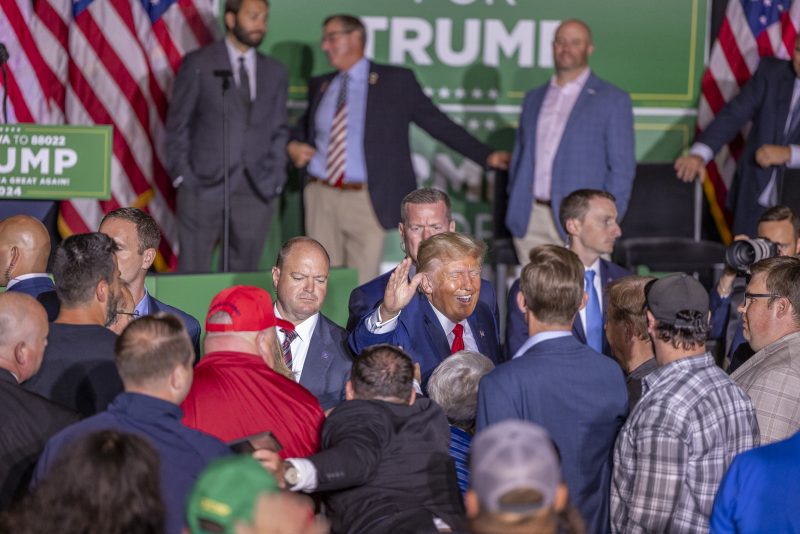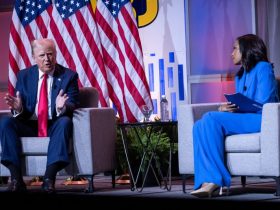NEOLA, Iowa — Mike Pence contrasts his stance on Vladimir Putin with Donald Trump’s less hostile posture toward the Russian president. He says Trump was “wrong” to try to pressure him to overturn the 2020 election results when he was vice president. And he accuses the former president of “shying away” from the antiabortion fight.
Florida Gov. Ron DeSantis and his campaign portray Trump as “running to the left,” of being a general-election liability and of taking insufficiently conservative stances on LGBTQ+ rights. Other GOP candidates and outside groups are trying an assortment of attacks over Trump’s legal problems, his stance on entitlement programs and his character. “Snake oil salesman,” is Chris Christie’s preferred broadside.
But the attacks so far do not appear to have diminished Trump’s front-runner status, according to interviews with GOP voters attending early campaign events, and with lawmakers and strategists, as well as a review of polling. With just over six months until the first nominating contest, here in Iowa, Trump holds a wide advantage in national surveys over a crowded field as his critics nervously confront the absence of a potent political argument against him — or a consensus on deploying one.
“What’s the opposite of cohesive?” said Sen. John Cornyn (R-Tex.), who has not endorsed in the GOP primary but has questioned Trump’s general-election chances. “There’s too many of them,” he said, speaking of the candidates.
Strategists across the party acknowledged Trump’s dominance, but some argued that it is still early and that the dynamic of the race could change, given the uncertainty surrounding Trump’s legal situation, the televised debates to come and the ad wars, which tend to heat up as the first contests draw near. The former president has been criminally indicted twice this year and also is under scrutiny in ongoing investigations in Fulton County, Ga., over efforts to overturn his defeat, and at the Justice Department into his involvement in the Jan. 6, 2021, attack on the U.S. Capitol by a pro-Trump mob. Trump has sought to turn the charges into a political rallying cry and has thrived in the polls as he has disparaged the charges with false claims and bluster.
During a summer when he has expanded his advantage over his rivals, even some voters who are open to those rivals’ pitches are nevertheless considering voting for the former president, as was evident here last week.
During a stop at the Pottawattamie County GOP Executive Council social hour, Pence urged attendees to “think carefully about the right leadership for our party” and emphasized the need to reelect the GOP House majority and win back the Senate. After the event, Pence reiterated to reporters that his message to potential Trump voters about his decision to certify the election results on Jan. 6, 2021 is that he had “no right to overturn” them.
“I did my duty under the Constitution,” Pence said.
Donna Barry, 75, a registered Republican who attended the meeting, said Pence “did what he had to do. He absolutely did. He followed the Constitution.” But, “I still like Trump,” she said, in addition to several other candidates.
Ray Wagner, 65, also gave Pence the benefit of the doubt, saying he “handled January 6 the way he needed to handle it.” Yet he also said he was open to supporting the former president in the Republican primary and suggested that he could win in a general election.
Although some candidates have alluded to their electability in comparison with Trump’s in a general election, with DeSantis arguing that the GOP needs to stop the “culture of losing” and former ambassador to the United Nations Nikki Haley warning voters not to “complain about what you get in a general if you don’t play in this caucus,” many GOP primary voters still see Trump as their best chance of beating Biden. A Monmouth University poll in May found that more than 6 in 10 Republican voters said Trump was probably or definitely the party’s strongest candidate to beat Biden, and about one-third thought another candidate would be stronger. The Trump campaign pointed to some national polls showing him ahead of President Biden.
Beyond electability, attacks against Trump include comments that Christie, a former New Jersey governor, has made on cable news networks about the ex-president’s character. They also include a Pence-aligned super PAC’s ads against Trump over Jan. 6 and for Trump’s favorable statements about Putin and North Korean leader Kim Jong Un. Many of the criticisms Trump’s rivals have lobbed at him are meant to accentuate their unique pitches to be the Republican nominee.
DeSantis, who is running a distant second behind Trump in the polls but is ahead of his other rivals, is seeking to appeal to many former Trump supporters and their priorities. He and his allies have hit Trump over key promises such as a border wall that has yet to be completed.
Others are taking a less direct approach, Sen. Tim Scott (R-S.C.), when asked recently on “Fox News Sunday” about his differences with Trump, argued that primary voters “are starving for a message filled with optimism, hope, anchored in conservative values with a backbone.” He has also split with Trump on Ukraine.
Some are trying to achieve a difficult balance: drawing a contrast with Trump but not angering Trump’s supporters. Tech entrepreneur Vivek Ramaswamy has centered his campaign on “America First 2.0” and suggested Trump is no longer an outsider. Yet Ramaswamy also led a push for candidates to commit to pardoning Trump.
Haley, a former member of the Trump administration, has focused many of her attacks in the race on DeSantis, not Trump. She has broken with Trump over Jan. 6 and said that he showed “moral weakness” against China while president. She also has sought to draw a generational contrast.
Yet, several candidates also have echoed Trump’s accusations of a weaponized Justice Department in light of the charges against him arising from a special counsel investigation.
For some allies of Pence’s, who are advancing a long-shot campaign based around calls for a return to traditional conservatism, the focus is on less-personal matters. “The bottom line needs to be you have to go after him. We come at it from going after him on policy,” said Mike Ricci, a spokesman for the pro-Pence super PAC “Committed to America.”
Some of Trump’s positions and actions, however, such as opposition to past free-trade pacts and skepticism of the U.S. efforts to help Ukraine in its war against Russia are echoed by some Republicans down the ballot and on Capitol Hill. Gunner Ramer, the political director of Republican Accountability PAC, an anti-Trump group, said the problem that has plagued critics in attacking Trump is that “voters like the job Trump did as president.”
“Do I see a cohesive message? No. I think it’s muddled,” he said. “And I think that the best pitch that these candidates can make is electability, and, oftentimes, I think that these Republican candidates are afraid to alienate Trump’s base.”
Trump continues to showcase strong enthusiasm among his backers. On Tuesday, his campaign rolled out endorsements from the entire GOP congressional delegation from Michigan. And last week, days after a crowded event in South Carolina, his supporters lined up in the rain to see him in Council Bluffs, Iowa. And several expressed confidence in interviews that Trump could win another White House term.
Jeanne Greisen, who identified herself as a registered Republican, said she attended the Trump rally because “there’s a lot of fun energy and, you know what? I just decided I need to go because I want to have hope.” Dean VanOort, 74, who also identified himself as a registered Republican in Minnesota, said he attended the event as “a hope for the future; otherwise, I wouldn’t stand out in the rain for two hours.”
During the rally, Trump repeatedly attacked DeSantis, as he has done continually in recent months, accusing him of having “no personality.” And he bragged about his lead in public surveys.
“It’s no wonder the swamp is getting truly desperate as they see us leading very big in the polls,” Trump said. “That’s why every time I get a subpoena, you know, my polls go up.”
Some Republican strategists do not see this as a sign that Trump has sewed up the nomination, emphasizing that it is too early for that to happen. Republican pollster Whit Ayres said he divides GOP primary voters into the following categories: “Never Trump” voters, whom he described as 10 percent of the party; “Always Trumpers,” whom he described as 35 percent of the party; and “Maybe Trump voters,” whom he described as 55 percent of the party.
“The critical part of the coalition are Maybe Trump voters,” Ayres said. “And so those are the people whom these Trump opponents who are not going after the Never Trump vote need to persuade.”
Ayres added that although electability generally is not an effective argument, it may carry more weight among primary voters in this cycle, given Trump’s legal entanglements.
The Win It Back PAC, which is aligned with the Club for Growth, recently debuted a multimillion-dollar ad campaign, according to Ad Impact. An ad from the group features a man who supported Trump but laments the “drama.” “We need somebody that can freakin’ win,” he says.
Another outside group is focusing intently on electability as it tries out its arguments. The anti-Trump group Americans for Prosperity Action — an arm of the network of donors and activists led by the conservative billionaire Charles Koch, recently began running two digital ads in early states, with one ad warning that Republicans could “lose everything” if Trump is the GOP nominee. The group has not endorsed a specific Trump rival.
For those looking to do so, the field remains open, some Republicans say, because of DeSantis’s stagnation and other candidates failure to expand their portion of the remaining vote beyond small shares. Several Republicans emphasized that many of the candidates are still trying to increase their name recognition.
Senate Minority Whip John Thune (R-S.D.), who has endorsed Scott, said that the candidates will need to make their case against Trump by presenting an alternative vision, but he has observed that several have sought to be deferential to Trump’s voters. He suggested that they eventually contrast their positions more sharply with the ex-president’s.
“If you’re somebody who actually wants to be taken seriously and get yourself positioned at least to be competitive against him, to be an alternative to him, then, yeah, I think they’re going to have to, candidates are going to become more aggressive,” Thune said.
Dylan Wells, Hannah Knowles, Perry Stein and Scott Clement contributed to this report.








